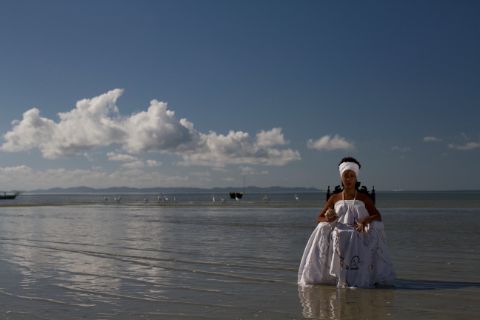Carol Barreto

Retrato de Família, Fotoserie. Foto: Roque Boa Morte
Carol Barreto unveils and expands the empowerment and communitarian narratives woven into the making and wearing of fabrics and garments by women from the quilombos of Northeast Brazil. A visual artist, university professor, and designer, through her work on ModAtivismo, Barreto explores the links between fashion and feminist and anti-racist activism, advocating also for conscious consumption and non-exploitative participation. Barreto’s collections such as VOZES [Voices] (2015–17) have prompted debates on national and international catwalks not only about the legacies of colonialism but also the resistance of the quilombos of Recôncavo Baiano. The collection Asè [life force] (2016–22), inspired by oral, cultural, and religious practices that form an imaginary of return and ancestral connection to Africa, honouring the history of Blackness in Brazil, is the base for her installation Omi. A sculptural dress emerges from a long train, reminiscent of a tablecloth, covering forty metres of HKW’s cloakroom desk. It is made from different family garments, such as the artist’s christening gown and her Yarogba costume from the Candomblé Nação Ketu, joined with pieces of different decorative techniques. The dress is accompanied by a soundscape, composed by Laila Rosa, of waves at Ilha de Maré and the clicking of bobbins of the quilombola women with whom she collaborates.
Commissioned by Haus der Kulturen der Welt (HKW), co-produced by Carol Barreto and HKW, 2023.
Works in the exhibition: Omi [Grandma] (2021–23), installation, fabric, cotton thread, garments, bobbin lace, renaissance lace, fillet lace, fuxico, textile waste, handmade textiles, tablecloth consisting of sixteen pieces of different lace: 260 × 40 cm each, historical pieces of clothing: dimensions vary, and one lace cushion: c. 30 × 45 cm; Retrato de Família [Family Portrait] (2021), photography printed on canvas, 138 × 92 cm, photographer: Roque Boa Morte. Courtesy of the artist